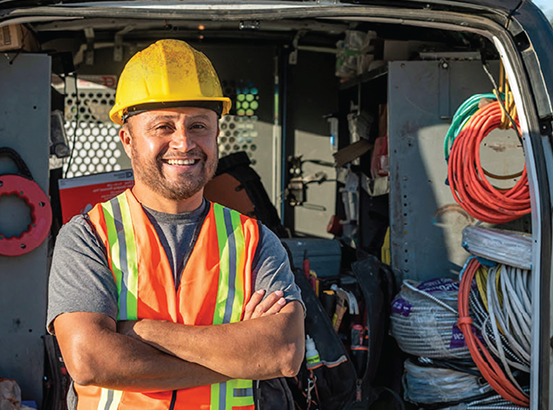Safety/Training
Safety is our top priority
Our Joint Apprenticeship Training Committee (JATC) provides our members – both apprentices and journeymen – with OSHA safety training to help protect them from workplace dangers.
We want to see all our members leave their shifts in the same condition they started, so IBEW members have the right to go home to their families at the end of each workday.
The IBEW Local 143 JATC provides industry-leading OSHA safety training to all our members. This training not only keeps them safe, but allows construction projects to progress efficiently with minimal downtime due to accidents and injuries. It ultimately reduces construction costs and helps projects meet completion deadlines.
Local 143 supports requiring all construction projects in Pennsylvania to require all workers to have OSHA certifications in order to work on a jobsite.
A union workforce is a safe workforce
According to the Center for Construction Research and Training (CPWR), more than 1,900 JATCs throughout the U.S. and Canada invest more than $1.5 billion annually to train more than 500,000 union construction workers, which includes safety and health. The IBEW Local 143 JATC is proud to be one of those 1,900-plus JATCs.
Unlike the non-union sector, building trades unions and their signatory contractors make a significant investment in safety training.
Discover the truth for yourself
The Impact of Unions on Construction Worksite Health and Safety
Evidence from OSHA Inspections
This study analyzed over 37,000 OSHA inspections in the construction industry in 2019 – including more than 2,800 at union worksites and nearly 34,200 at nonunion worksites – and reveals that union worksites have significantly fewer health and safety violations
Updating a study on the union effect on safety in the ICI construction sector
Extending an earlier study from 2015, this study found the union construction industry has lower incidences of Workers’ Compensation lost time injuries than the non-union sector.
It all begins with training
Training is at the heart of the union construction industry.
Whether our members are receiving OSHA training, learning the trade through our Registered Apprenticeship Program or are undergoing journeymen upgrade training, they are improving themselves for the jobsite.
Registered Apprenticeship Program
Registered apprenticeship programs are regulated by the U.S. Department of Labor and must adhere to specific standards and guidelines to ensure a high quality of education and training.
The IBEW Local 143 Registered Apprenticeship Program uses the earn-while-you-learn method to turn apprentices into journeymen.
This means they receive on-the-job training and classroom instruction while earning a living wage. The on-the-job experience allows apprentices to learn the trade from experienced journeymen, gaining valuable insight and knowledge on various aspects of their craft.
Besides learning on the jobsite, apprentices also receive free, mandatory classroom instruction, where they are taught many of the fundamentals and advanced concepts they will use throughout their careers.
Journeymen upgrade training
The IBEW Local 143 JATC offers journeymen upgrade classes to keep our members the most skilled electricians in the greater Harrisburg area. This includes regular OSHA safety recertification.
Journeymen upgrade training ensures our electricians remain the safest and most efficient electrical workforce in the region. It helps our members stay up to date on the latest industry trends, tools, technology and education.
More Industry Issues:
Responsible Contracting
